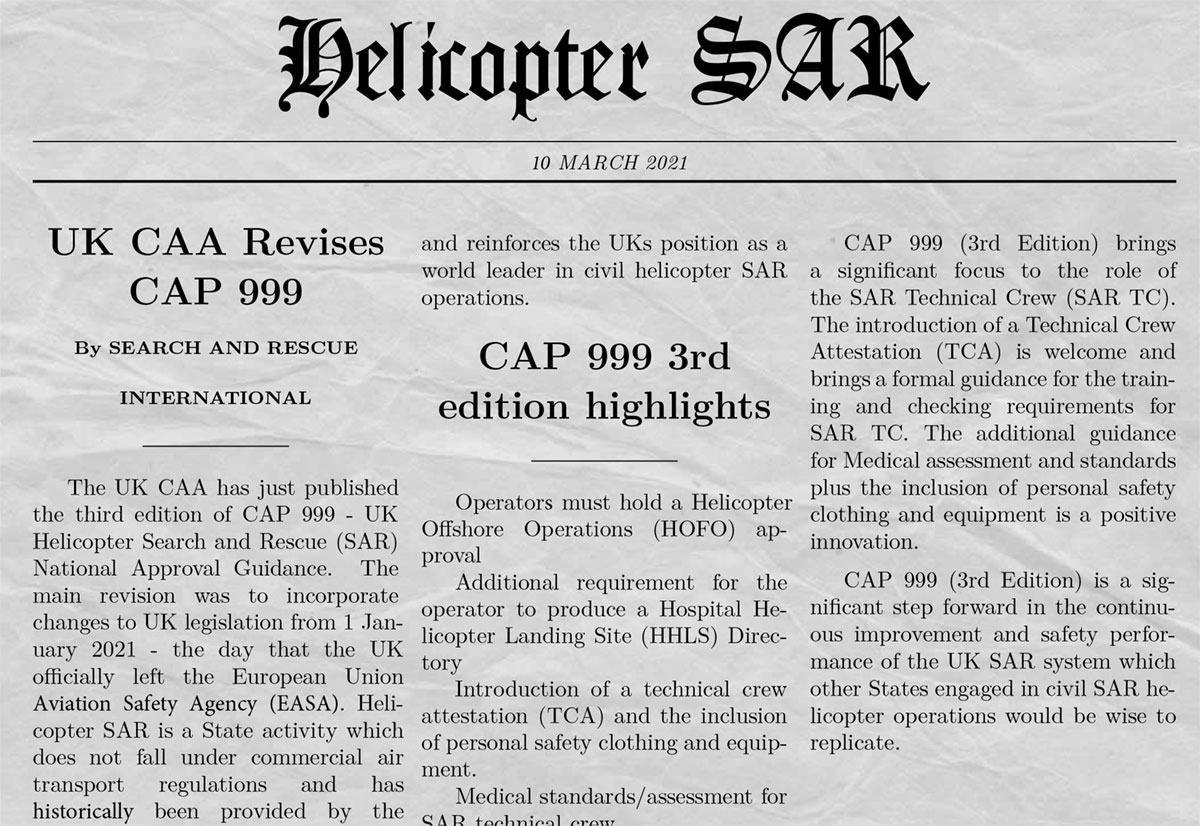
Case Studies
Case Study 02: National Helicopter SAR Rules

Search and Rescue is a State activity alongside military, customs, police, firefighting, border control and coastguard or similar activities and services undertaken in the public interest.
It is the responsibility of the national civil aviation authority to develop, publish and maintain civil guidance, rules or legislation for this most demanding of aviation environments.
The UK CAA has now published edition 3 of CAP 999 and below we highlight the main areas of development.
The main revision of edition 3 of CAP 999 was to incorporate changes to UK legislation as from 1 January 2021 on leaving EASA, the new edition also includes the following updates:
- The requirement for an operator to hold a Helicopter Offshore Operations (HOFO) approval in accordance with Air Ops, Part-SPA, Subpart K [2.7, 4].
- Extra considerations regarding permissions and exemptions, e.g. SAR role demonstration flights [2.15 and 2.16].
- Removal of the requirement for operators to establish a method of recording which flights are SAR and which are public transport [previously 3.4].
- Additional requirement for the operator to produce a Hospital Helicopter Landing Site (HHLS) Directory [3.7].
- A revamp of 3.8, The SAR Crew, including the introduction of a technical crew attestation (TCA) and the inclusion of personal safety clothing and equipment.
- Medical standards/assessment for SAR technical crew moved from 4.5/4.6 to 3.8 3 b)
- New para 3.16, Helicopter equipment general
- The requirements for a SAR operating base facilities have been updated at 3.17 – 3.19
- The passenger safety requirements have been updated at 3.22
- The requirements for Ground/maritime emergency service personnel moved from 4.10 to 3.23
- There is a complete revamp of training and checking for SAR technical crew members from para 4.2 onwards.
It is the introduction of a TCA and this last bullet point on technical crew training and checking that are significant and welcome updates. We were not able to progress the licencing of technical crew at this projects’ initiation so we see technical crew attestations as a significant step forward in the continuous improvement and safety performance of the UK SAR system.
How can Search and Rescue International help?
A Government department responsible for exercising a State’s SAR obligations may not have access to suitably qualified and experienced personnel who can construct national helicopter SAR guidance, rules or legislation. Search and Rescue International can provide independent and experienced specialist SAR consultants to manage and facilitate the appropriate insight, data gathering and analysis, generating a package of options and recommended solutions tailor-made to fit your specific SAR environment.
We have access to a range of expert consultants from the maritime and aviation SAR domains, representing a wide spectrum of SAR experience from full-time staff to associate consultants who support us on specific projects.
Depending on the project requirements, we will tailor a solution to your specific needs. We have experience in developing SAR aviation rules from first principles in several nations, therefore get in touch to discuss how we can assist your State to develop and improve this vital element of your National SAR system.